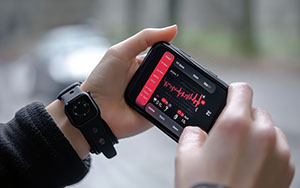Cardiovascular disease is the leading cause of mortality worldwide, responsible for 18 million deaths annually, according to the World Health Organization (WHO). The urgency for innovative solutions in cardiac care has never been greater. Technologies such as wearable ECG devices, which can continuously monitor heart rhythms, and AI-driven tools for arrhythmia detection are transforming the management of heart conditions.
Nurses play a critical role in this transformation, acting as educators, facilitators, and advocates for the integration of these advancements into patient care. This article will examine how these state-of-the-art tools enable nurses to enhance patient outcomes and redefine the delivery of cardiac care.
Advances in Cardiac Care Technologies
The introduction of wearable ECG devices has transformed cardiac care by providing portable and patient-friendly solutions for continuous heart monitoring. Devices such as the Apple Watch and the Zio Patch facilitate real-time detection of arrhythmias and improve patient compliance with monitoring protocols. Early identification of conditions like atrial fibrillation is crucial in mitigating the risk of severe complications, including strokes, through prompt medical intervention.
The application of artificial intelligence (AI) in arrhythmia detection further enhances cardiac care by utilizing algorithms capable of analyzing extensive cardiac data with speed and precision. For instance, AI-powered ECG systems, like those incorporated into AliveCor's Kardia platform, minimize diagnostic errors and accelerate treatment decisions by identifying patterns that may not be discernible through traditional analysis methods. Collectively, these advanced technologies enable healthcare teams, particularly nurses, to provide more accurate, efficient, and proactive cardiac care.
The Nurse's Role in Implementing Cardiac Technologies
Nurses play a crucial role in ensuring that patients benefit from advanced cardiac technologies. As educators, they guide patients in effectively using wearable ECG devices, such as the Zio Patch, by instructing on proper placement and adherence to monitoring routines. This patient education promotes compliance, enabling accurate data collection and early detection of abnormalities such as arrhythmias, reducing hospitalizations and complications.
In clinical practice, nurses act as facilitators by seamlessly integrating wearable devices and AI-powered tools into individualized care plans. By monitoring data insights from devices like the AliveCor Kardia platform, they collaborate with physicians to identify and address cardiac risks in real-time, expediting interventions and improving outcomes.
Additionally, nurses serve as advocates for the ethical and equitable use of technology. They address privacy concerns by educating patients about data security measures while working within healthcare systems to ensure compliance with laws such as HIPAA. Nurses also strive to bridge disparities by advocating for access to these advanced tools for underserved populations, emphasizing that innovative care should be universally available.
Through these roles, nurses empower patients and healthcare teams to harness the full potential of cardiac technologies, thereby advancing heart health and patient outcomes.
Case Study: Implementation of Technology
Mr. Smith, a 65-year-old patient with a history of atrial fibrillation, was prescribed a wearable ECG device, the Zio Patch, for continuous monitoring. Upon receiving the device, his nurse provided comprehensive instructions on its use, including proper placement, maintenance, and an overview of what to expect during the monitoring period. The nurse emphasized the necessity of consistent usage to ensure accurate data collection, which Mr. Smith followed meticulously.
As data were transmitted from the device, the nurse detected irregular heart rhythms indicating a potential exacerbation of Mr. Smith's condition. Recognizing the associated risk, she promptly informed the care team, facilitating an immediate review and adjustment of Mr. Smith's treatment plan. This proactive intervention successfully averted a potential hospitalization, thereby conserving time and medical resources.
The result? An improvement in Mr. Smith's health, and he expressed appreciation for the seamless integration of technology and care. This case underscores the significant impact of advanced cardiac monitoring tools on nursing practice, demonstrating their ability to enhance patient outcomes effectively.
Challenges Nurses Encounter
While integrating cardiac technologies offers considerable potential, nurses encounter several challenges. Adapting to new tools, such as wearable ECG devices or AI-powered platforms, typically necessitates extensive training and ongoing education to develop confidence and proficiency. For instance, mastering data interpretation from systems like the AliveCor Kardia can be time-consuming.
Furthermore, the volume of cardiac data generated by these technologies can result in information overload, making it challenging for nurses to prioritize actionable insights amidst other clinical responsibilities.
Resource disparities also present significant obstacles, as not all healthcare facilities can afford advanced devices or provide equal access to patients, thereby exacerbating health inequities. Addressing these challenges through robust training programs, streamlined data workflows, and advocacy for equitable resource allocation will be essential to fully leverage the benefits of cardiac technology.
Nursing Opportunities in Cardiac Care
The integration of advanced cardiac technologies affords nurses numerous opportunities to expand their professional roles. Nurses can play pivotal roles in technology adoption initiatives, ensuring the seamless integration of tools such as wearable ECG devices into clinical workflows. Furthermore, pursuing specialized training or certifications, such as those offered by the American Nurses Credentialing Center (ANCC), provides nurses with the necessary expertise in technology-enabled cardiac care.
The increasing demand for remote monitoring also presents opportunities in telehealth and home-based care. By managing data from wearable devices and conducting virtual consultations, nurses can provide proactive, patient-centered care that reduces hospital visits and improves health outcomes.
Conclusion
Wearable ECG devices and AI-driven tools are revolutionizing cardiac care by facilitating early detection, precise diagnostics, and enhanced patient outcomes. Nurses play a critical role in this transformation, from educating patients to integrating these technologies into clinical practice. Continuously pursuing professional development and advocating for the adoption of advanced tools empowers nurses to lead the future of heart health care.
Integrating technology into nursing transcends mere innovation—it represents a lifesaving advancement that enhances patient care and ensures superior outcomes. By embracing these advancements, nurses can redefine their roles and make a significant impact on cardiac care.

